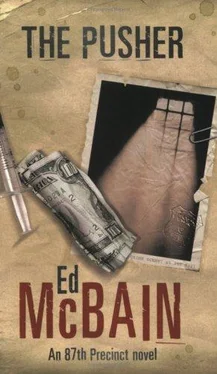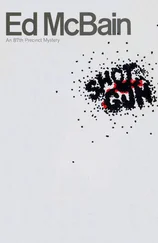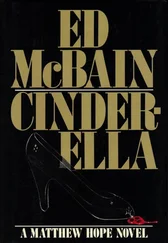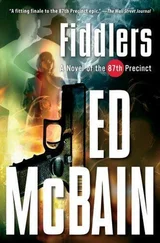Ed McBain - Pusher
Здесь есть возможность читать онлайн «Ed McBain - Pusher» весь текст электронной книги совершенно бесплатно (целиком полную версию без сокращений). В некоторых случаях можно слушать аудио, скачать через торрент в формате fb2 и присутствует краткое содержание. Жанр: Полицейский детектив, на английском языке. Описание произведения, (предисловие) а так же отзывы посетителей доступны на портале библиотеки ЛибКат.
- Название:Pusher
- Автор:
- Жанр:
- Год:неизвестен
- ISBN:нет данных
- Рейтинг книги:4 / 5. Голосов: 1
-
Избранное:Добавить в избранное
- Отзывы:
-
Ваша оценка:
- 80
- 1
- 2
- 3
- 4
- 5
Pusher: краткое содержание, описание и аннотация
Предлагаем к чтению аннотацию, описание, краткое содержание или предисловие (зависит от того, что написал сам автор книги «Pusher»). Если вы не нашли необходимую информацию о книге — напишите в комментариях, мы постараемся отыскать её.
Pusher — читать онлайн бесплатно полную книгу (весь текст) целиком
Ниже представлен текст книги, разбитый по страницам. Система сохранения места последней прочитанной страницы, позволяет с удобством читать онлайн бесплатно книгу «Pusher», без необходимости каждый раз заново искать на чём Вы остановились. Поставьте закладку, и сможете в любой момент перейти на страницу, на которой закончили чтение.
Интервал:
Закладка:
And if this other thing was true, and if it broke, what untold harm would be done then? Not only, to Byrnes himself, but to Harriet, God, why should Harriet have to suffer, Harriet so innocent, and the police department, how would it look for the police department, oh Jesus let it not be true, let it be a lousy punk lie.
He sat in the parked car and he waited, certain he would recognize him when he came out of the building. The building was in Calm's Point, where Byrnes lived, and it was surrounded by lawn, and there were trees placed all around it, trees bare now with winter, their roots clutching frozen earth, the bases of their trunks caked with snow. There were lights burning in the building, and the lights were a warm amber against the cold winter sky, and Byrnes watched the lights and wondered.
He was a compact man, Byrnes, with a head like a rivet. His eyes were blue and tiny, but they didn't miss very much, and they were set in a browned and weathered face that was seamed with wrinkles. His nose was craggy like the rest of his face, and his mouth was firm with a weak upper lip and a splendid lower lip. He had a chin like a cleft boulder, and his head sat low on his shoulders, as if it were hunched in defense. He sat in the car, and he watched his own breath plume whitely from his lips, and he reached over to wipe the fogged windshield with a gloved hand, and then he saw the people coming from the building.
Young people, laughing and joking. A boy stopped to roll a snowball and hurl it at a young girl who shrieked in gleeful terror. The boy chased her into the shadows then, and Byrnes watched, searching for a face and figure he could recognize. There were more people now. Too many to watch without being close. Hastily, Byrnes stepped out of the car. The cold attacked his face instantly. He hunched his shoulders and walked toward the building.
"Hello, Mr. Byrnes," a boy said, and Byrnes nodded and studied the faces of the other boys who were swarming past. And then suddenly, as if a dam hole had been plugged, the tide stopped. He turned and watched the kids as they sauntered away, and then he sucked in a deep breath and started up the steps, passing beneath an arch upon which were chiseled the words CALM'S POINT HIGH SCHOOL.
He had not been inside this building once since his visit during Open School Week back in… how many years had it been? Byrnes shook his head. A man should take more care , he thought. A man should watch these things. But how could anyone have even suspected, and how could anyone have prevented, Harriet, Harriet, she should have watched more carefully, if this thing is true, if it is true.
The auditorium, he supposed. That was where they'd be. If there were any more of them, they would be in the auditorium. The school was very quiet, closed for the night, and he could hear the hollow tattoo of his own shoes against the marbled main floor of the building. He found the auditorium by instinct, and he smiled wryly, reflecting that he wasn't such a bad detective after all. Christ, what would this thing do to the police department?
He opened the door. A woman stood at the far end of the auditorium, near the piano. Byrnes pulled back his shoulders and started down the long aisle. The woman was the only other person in the large, high-ceilinged room. She looked up expectantly as he approached her. She was in her mid-forties, a stoutish woman who wore her hair in a bun at the back of her neck. She had a mild, pleasant face with cowlike brown eyes.
"Yes?" she asked, her head lifted, her eyebrows lifted, her voice lifted. "May I help you?"
"Perhaps so," Byrnes said, mustering up a genial smile. "Is this where you're rehearsing the senior play?"
"Why, yes," the woman said. "I'm Miss Kerry. I'm directing the show."
"How do you do," Byrnes said. "I'm very happy to know you."
He felt suddenly awkward. His mission, he felt, was a basically secretive one, and he did not feel like exchanging pleasant cordialities with a high-school teacher.
"I saw the boys and girls leaving," he said.
"Yes," Miss Kerry replied, smiling.
"I thought since I was in the neighborhood, I'd stop by and give my son a lift home. He's in the show, you know." Byrnes forced another smile. "Talks about it at home all the time."
"Oh, is that right?" Miss Kerry said, pleased.
"Yes. But I didn't see him outside with the other kids. I was wondering if you…" He glanced up at the darkened, empty stage. "… had him in here working with the…" His sentence lost momentum. "… sets or… or something."
"You probably missed him," Miss Kerry said. "The cast and crew all left just a few minutes ago."
"All of them?" Byrnes asked. "Larry, too?"
"Larry?" Miss Kerry frowned momentarily. "Oh, yes, Larry. Of course. Yes, I'm sorry, but he left with the others."
Byrnes felt an enormous sense of relief. If nothing else, the show accounted for his son's evenings. He had not lied on that score. The smile mushroomed onto his face. "Well," he said, "I'm sorry to have troubled you."
"Not at all. It's I who should apologize, not remembering Larry's name instantly. He's the only Larry working on the show, and he's really doing a fine job."
"Well, I'm glad to hear that," Byrnes said.
"Yes, Mr. Schwartz," Miss Kerry replied, "you should be very proud of your son."
"Well, I am. I'm happy to hear…" Byrnes stopped. He stared at Miss Kerry for a long, terrible moment.
"My son is Larry Byrnes," he said.
Miss Kerry frowned. "Larry Byrnes. Oh, I'm sorry. I mean… your son isn't in the show at all. Did he say he was? That is… well, he didn't even try out for it."
"I see," Byrnes said tightly.
"I do hope I haven't… that is, well, perhaps the boy had reasons of his own for wanting you to believe he was… well… you can't always take these things on face value, Mr. Byrnes. The boy undoubtedly had reasons."
"Yes," Byrnes said sadly. "I'm afraid he had."
He thanked Miss Kerry again, and then left her in the big, empty auditorium.
Chapter Eight
Byrnes sat in the living room and listened to the methodically monotonous locking of the grandfather clock. The clock had always been a comfort to him, a possession he'd desired ever since he'd been a boy. He could not have told why he'd wanted a grandfather clock for his own, but he had wanted one, and one day he and Harriet had driven out to the country and stopped at an old barn repainted red and white, displaying the sign ANTIQUES.
The proprietor of the shop had been a thin, wispish man with an effeminate walk, dressed like a country squire,' complete with weskit and leather-elbow-patched sports jacket. He had floated around among his rare pieces of china and cut glass, fluttering anxiously whenever Harriet lifted a piece of crockery. Eventually, they had got around to the grandfather clock. There were several clocks, and one was going for $573, and had been made in England, and was signed and dated by the craftsman who had fashioned it. It was still in fine working order, a stately, proud time-telling machine. Another clock had been made in America, and it was unsigned and undated, and it would probably need repairs—but it cost only $200.
When the proprietor saw that Byrnes' interest was in the cheaper clock, he immediately disqualified them as true aficionados . Caustically, he said, "Well, of course, if you want the garden variety of grandfather clock," and then concluded the deal with barely disguised distaste. Byrnes had taken his garden variety of grandfather clock home. The local jeweler had charged $14 to set it in fine running condition. It had never given Byrnes a bit of trouble since. It stood now in the hallway, and it tocked off the minutes in a deep monotonous voice, and its delicately wrought hands held the white moon face in a wide-angled grin, and the grin read ten minutes to two.
Читать дальшеИнтервал:
Закладка:
Похожие книги на «Pusher»
Представляем Вашему вниманию похожие книги на «Pusher» списком для выбора. Мы отобрали схожую по названию и смыслу литературу в надежде предоставить читателям больше вариантов отыскать новые, интересные, ещё непрочитанные произведения.
Обсуждение, отзывы о книге «Pusher» и просто собственные мнения читателей. Оставьте ваши комментарии, напишите, что Вы думаете о произведении, его смысле или главных героях. Укажите что конкретно понравилось, а что нет, и почему Вы так считаете.












